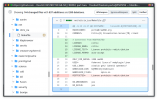Some have lost of ports build from source, some have few, some have none.
This is my ports list
All my rest are packages, some 3600.
This is my ports list
Code:
sysutils/syslog-ng
databases/mariadb1011-client
databases/mariadb1011-server
multimedia/ffmpeg
multimedia/phonon-vlc
multimedia/vlc
audio/alsa-sndio
audio/gstreamer1-plugins-sndio
audio/sndio
multimedia/audacious
multimedia/audacious-plugins
x11-themes/audacious-skins
audio/strawberry
www/firefox-esr

